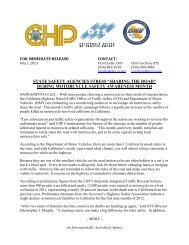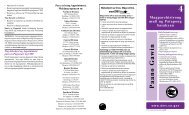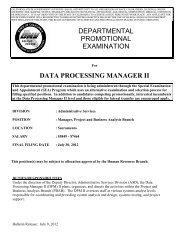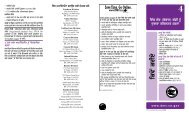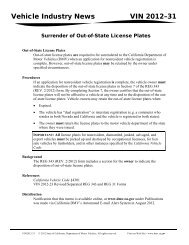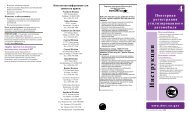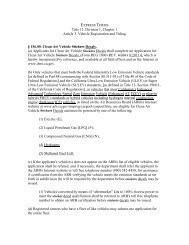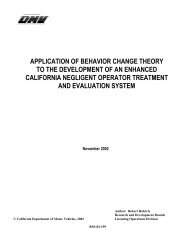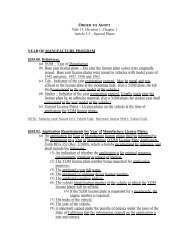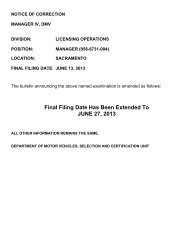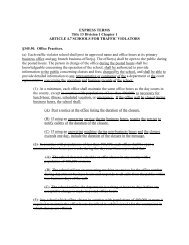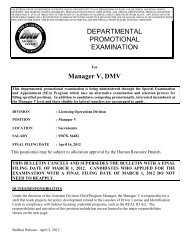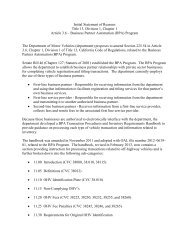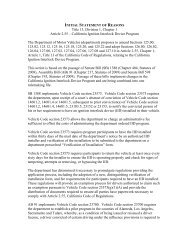Commercial Driver Handbook ( PDF ) - California Department of ...
Commercial Driver Handbook ( PDF ) - California Department of ...
Commercial Driver Handbook ( PDF ) - California Department of ...
Create successful ePaper yourself
Turn your PDF publications into a flip-book with our unique Google optimized e-Paper software.
AntIlOck BRAkIng SyStemS<br />
vehiCles required to have antiloCk<br />
Braking systems<br />
The <strong>Department</strong> <strong>of</strong> Transportation requires that<br />
antilock braking systems be on:<br />
• Air brakes vehicles, (trucks, buses, trailers<br />
and converter dollies) built on or after March<br />
1, 1998.<br />
• Hydraulically braked trucks and buses with a<br />
gross vehicle weight rating <strong>of</strong> 10,000 lbs. or<br />
more built on or after March 1, 1999.<br />
Many buses built before these dates have been<br />
voluntarily equipped with ABS.<br />
Your school bus will have a yellow ABS malfunction<br />
lamp on the instrument panel if it is equipped<br />
with ABS.<br />
hoW aBs helps you<br />
When you brake hard on slippery surfaces in a<br />
vehicle without ABS, your wheels may lock up.<br />
When your steering wheels lock up, you lose<br />
steering control. When your other wheels lock up,<br />
you may skid or even spin the vehicle.<br />
ABS helps you avoid wheel lock up and maintain<br />
control. You may or may not be able to stop faster<br />
with ABS, but you should be able to steer around<br />
an obstacle while braking, and avoid skids caused<br />
by over braking.<br />
Braking With aBs<br />
When you drive a vehicle with ABS, you should<br />
brake as you always have. In other words:<br />
• Use only the braking force necessary to stop<br />
safely and stay in control.<br />
• Brake the same way, regardless <strong>of</strong> whether you<br />
have ABS on the bus. However, in emergency<br />
braking, do not pump the brakes on a bus with<br />
ABS.<br />
• As you slow down, monitor your bus and back<br />
<strong>of</strong>f the brakes (if it is safe to do so) to stay in<br />
control.<br />
Braking if aBs is not Working<br />
Without ABS, you still have normal brake functions.<br />
Drive and brake as you always have.<br />
Vehicles with ABS have yellow malfunction lamps<br />
to tell you if something is not working. The yellow<br />
ABS malfunction lamp is on the bus’s instrument<br />
panel.<br />
As a system check on newer vehicles, the malfunction<br />
lamp comes on at start-up for a bulb check and<br />
then goes out quickly. On older systems, the lamp<br />
could stay on until you are driving over five mph.<br />
If the lamp stays on after the bulb check, or goes<br />
on once you are under way, you may have lost<br />
ABS control at one or more wheels.<br />
Remember, if your ABS malfunctions, you still<br />
have regular brakes. Drive normally, but get the<br />
system serviced soon.<br />
safety reminders<br />
• ABS won’t allow you to drive faster, follow<br />
more closely, or drive less carefully.<br />
• ABS won’t prevent power or turning skids–<br />
ABS should prevent brake-induced skids but<br />
not those caused by spinning the drive wheels<br />
or going too fast in a turn.<br />
• ABS won’t necessarily shorten stopping distance.<br />
ABS will help maintain vehicle control,<br />
but not always shorten stopping distance.<br />
• ABS won’t increase or decrease ultimate<br />
stopping power–ABS is an “add-on” to your<br />
normal brakes, not a replacement for them.<br />
• ABS won’t change the way you normally brake.<br />
Under normal brake conditions, your vehicle<br />
will stop as it always stopped. ABS only comes<br />
into play when a wheel would normally have<br />
locked up because <strong>of</strong> over braking.<br />
• ABS won’t compensate for bad brakes or poor<br />
brake maintenance.<br />
• Remember: The best vehicle safety feature is<br />
still a safe driver.<br />
• Remember: Drive so you never need to use<br />
your ABS.<br />
• Remember: If you need it, ABS could help to<br />
prevent a serious collision.<br />
- 143 -



